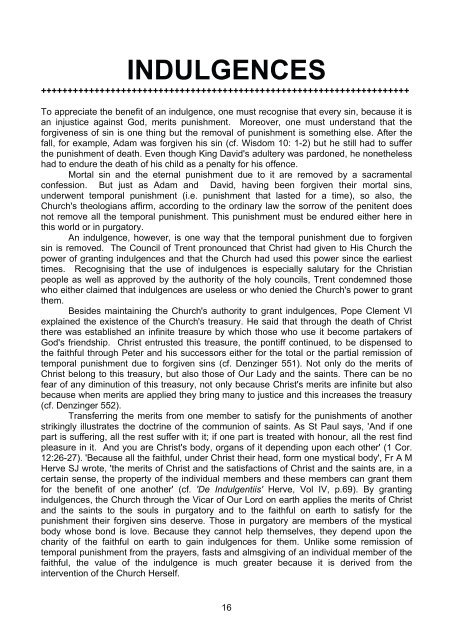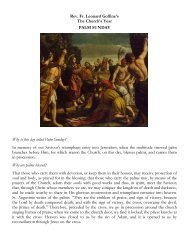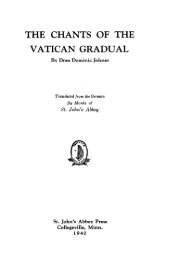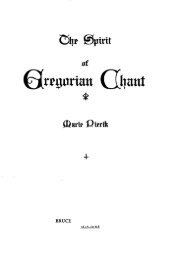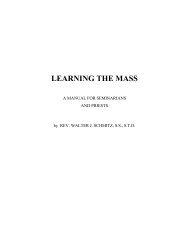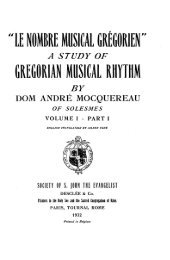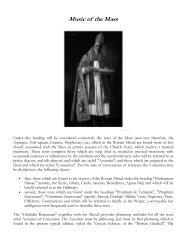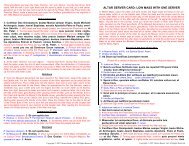The Latin Mass Society - SanctaMissa.org
The Latin Mass Society - SanctaMissa.org
The Latin Mass Society - SanctaMissa.org
Create successful ePaper yourself
Turn your PDF publications into a flip-book with our unique Google optimized e-Paper software.
INDULGENCES<br />
+++++++++++++++++++++++++++++++++++++++++++++++++++++++++++++++++++++<br />
To appreciate the benefit of an indulgence, one must recognise that every sin, because it is<br />
an injustice against God, merits punishment. Moreover, one must understand that the<br />
f<strong>org</strong>iveness of sin is one thing but the removal of punishment is something else. After the<br />
fall, for example, Adam was f<strong>org</strong>iven his sin (cf. Wisdom 10: 1-2) but he still had to suffer<br />
the punishment of death. Even though King David's adultery was pardoned, he nonetheless<br />
had to endure the death of his child as a penalty for his offence.<br />
Mortal sin and the eternal punishment due to it are removed by a sacramental<br />
confession. But just as Adam and David, having been f<strong>org</strong>iven their mortal sins,<br />
underwent temporal punishment (i.e. punishment that lasted for a time), so also, the<br />
Church's theologians affirm, according to the ordinary law the sorrow of the penitent does<br />
not remove all the temporal punishment. This punishment must be endured either here in<br />
this world or in purgatory.<br />
An indulgence, however, is one way that the temporal punishment due to f<strong>org</strong>iven<br />
sin is removed. <strong>The</strong> Council of Trent pronounced that Christ had given to His Church the<br />
power of granting indulgences and that the Church had used this power since the earliest<br />
times. Recognising that the use of indulgences is especially salutary for the Christian<br />
people as well as approved by the authority of the holy councils, Trent condemned those<br />
who either claimed that indulgences are useless or who denied the Church's power to grant<br />
them.<br />
Besides maintaining the Church's authority to grant indulgences, Pope Clement VI<br />
explained the existence of the Church's treasury. He said that through the death of Christ<br />
there was established an infinite treasure by which those who use it become partakers of<br />
God's friendship. Christ entrusted this treasure, the pontiff continued, to be dispensed to<br />
the faithful through Peter and his successors either for the total or the partial remission of<br />
temporal punishment due to f<strong>org</strong>iven sins (cf. Denzinger 551). Not only do the merits of<br />
Christ belong to this treasury, but also those of Our Lady and the saints. <strong>The</strong>re can be no<br />
fear of any diminution of this treasury, not only because Christ's merits are infinite but also<br />
because when merits are applied they bring many to justice and this increases the treasury<br />
(cf. Denzinger 552).<br />
Transferring the merits from one member to satisfy for the punishments of another<br />
strikingly illustrates the doctrine of the communion of saints. As St Paul says, 'And if one<br />
part is suffering, all the rest suffer with it; if one part is treated with honour, all the rest find<br />
pleasure in it. And you are Christ's body, <strong>org</strong>ans of it depending upon each other' (1 Cor.<br />
12:26-27). 'Because all the faithful, under Christ their head, form one mystical body', Fr A M<br />
Herve SJ wrote, 'the merits of Christ and the satisfactions of Christ and the saints are, in a<br />
certain sense, the property of the individual members and these members can grant them<br />
for the benefit of one another' (cf. 'De Indulgentiis' Herve, Vol IV, p.69). By granting<br />
indulgences, the Church through the Vicar of Our Lord on earth applies the merits of Christ<br />
and the saints to the souls in purgatory and to the faithful on earth to satisfy for the<br />
punishment their f<strong>org</strong>iven sins deserve. Those in purgatory are members of the mystical<br />
body whose bond is love. Because they cannot help themselves, they depend upon the<br />
charity of the faithful on earth to gain indulgences for them. Unlike some remission of<br />
temporal punishment from the prayers, fasts and almsgiving of an individual member of the<br />
faithful, the value of the indulgence is much greater because it is derived from the<br />
intervention of the Church Herself.<br />
16


